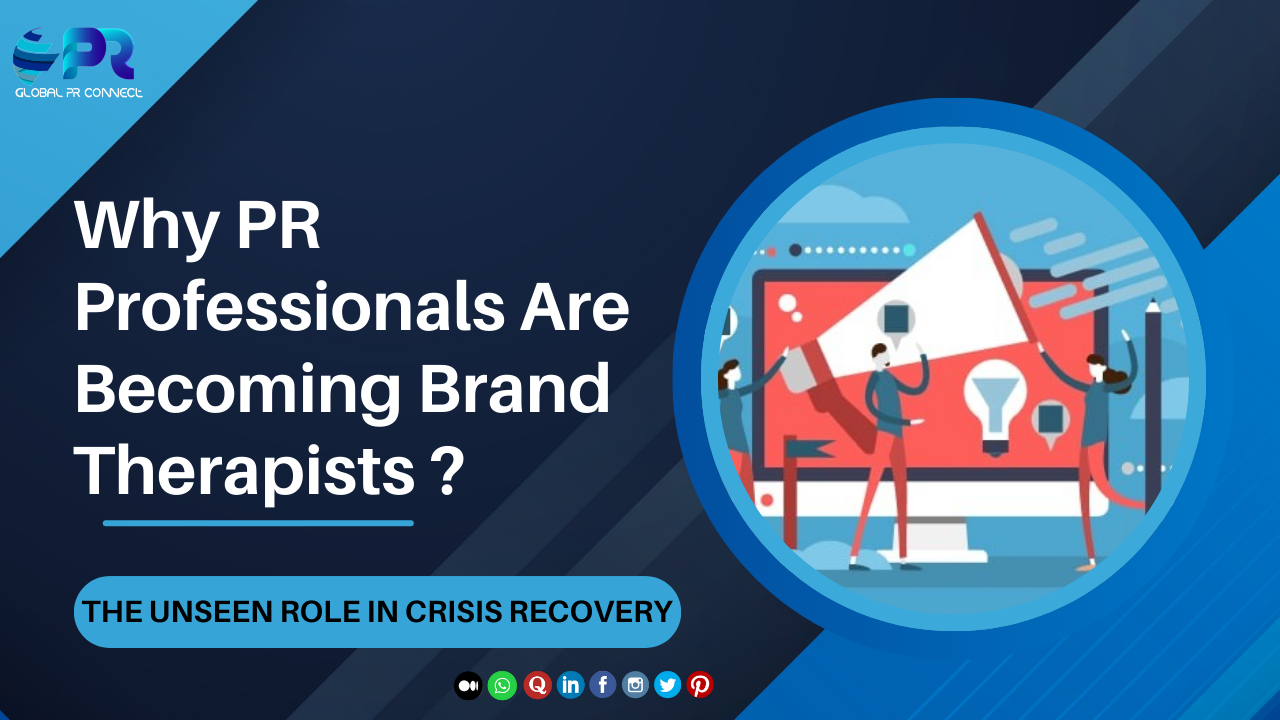In today’s world, where brands are under the spotlight all the time, one wrong move can become a massive crisis. Whether it is a social media mishap, a product failure, or negative publicity, the fall can be swift and unforgiving. The job of a PR professional has evolved. They are no longer just managing press releases or drafting media responses—they are becoming brand therapists. This shift in their role reflects a much deeper, more emotional approach in handling brand crises. Actually, PR professionals today are tasked not only with repairing the image of the brand but also rebuilding that emotional connection with its customers.
The Changing Landscape of Crisis Management
![]()
The traditional approach to managing a crisis was simple: the statement, the apology, and the hope that the media would take the bait and move on to the next story. Things have changed, however-and fast. Crises, especially through social media, can spin out of control more quickly than ever. Crisis management has evolved from just fixing to restoring emotional trust. It is no longer about what a brand does in the first 24 hours; it’s about how it navigates itself through the storm and restoring human, genuine connections to its audience.
Besides the technical side of the crisis, brands have to deal with the emotional side. The customer is no longer satisfied with just facts; they want to feel empathy, understand why such a mistake occurred, and know what steps are being taken to ensure that it does not happen again. PR professionals have emerged as brand therapists guiding brands through this complexity.
What Does a Brand Therapist Do?

In this new age of PR, brand therapists mend reputation but seek emotional healing too. It has often been a painful moment not only for the brand itself but also for its audiences; the PR professional does it with care, with understanding, and with empathy for the brand. Here’s how:
Listening: The first step to recovery. Brand therapists observe what the audience says concerning the brand—whether it was negative or positive. From here, a root cause of the matter may be understood, what emotion that relates to, and act on it. In like manner, a PR professional listens to the audience; a therapist listens to his or her client to guide his recovery process through their feedback.
Restoring Trust: The weakest point of any brand relationship is that of trust. Once lost, this takes time and earnest efforts to regain. Public Relations work with the brand in fashioning messages not only sorry but also reflective of a legitimate intent to change. They aid in forming strategies that demonstrate consistent positive actions that make the brand earn its trust once again over time.
Empathy and Authenticity: People can spot a manipulative brand. The era of speak corporate and robo-pology is over. PR folks assist brands to speak, in their voice, in communication that shows that they indeed understand the impact of emotional distress of the crisis. Every word sounds legitimate, sincere, and humane.
Personalized Response: Every crisis is different and so should be the response. The strategies are designed by PR professionals with the specifics of the crisis in mind. It might range from an apology in public to proactive outreach campaigns or even internal processes overhauls to find a solution that would appeal to the audience.
Transparency and Communication: The very element of crisis recovery is transparency. Brands cannot use vague statements or vague promises as a shield. The PR professional helps formulate a clear, consistent message that actually exposes the problem and what the brand is doing to recover from it. Such frankness assuages the audience and bolsters the legitimacy of the action taken by the brand.
The Emotive Component of Crisis Recovery
Crisis recovery is far removed from the restoration of brand damage from the outside; it involves gaining an understanding of the emotional hurt left on the brand, and even its customers, in many cases. Today, with social media on the forefront, consumers expect something more out of a transactional relationship with brands; instead, they want brands to show some heart and empathy. In this environment, PR professionals will be required to be prepared to not only manage the optics but also the emotional backlash.
PR professionals are the emotional support systems for brands. They can help correct mistakes and get their reputation back with integrity. Much like a therapist would guide someone through a tough time, PR experts help brands gain perspective, make necessary adjustments, and improve communication to avoid such crises in the future.
Also Read: 6 Innovative PR Approaches to Transform Tweets into Lasting Movements
Long-term healing: After the crisis
The real work of a brand therapist happens long after the crisis has faded from the headlines. True recovery takes time, and PR professionals are there for the long haul, ensuring that the brand doesn’t just survive the crisis but emerges stronger. After the crisis, PR professionals help brands reflect on the lessons learned, adjust their practices, and commit to a long-term strategy that will prevent similar issues from arising again.
It’s all about growth: recovery from the crisis but this time more importantly, growth or transformation from the crisis. These are all internal changes, some process improvements, and a welcome use of the crisis as an effective vehicle for meaningful transformation that is real, true, and enduring. Such brands come out of the crisis with refreshed credibility and deeper emotional bonds with its customers.
The Shift towards Empathy in PR

What is so great about this shift is that empathy in PR has played such a massive role. From PR professionals healing the emotional distance between a brand and its audience, rather than fixing the image of the brand, there is much more in store now. The power of empathy will be unstoppable when earned through authenticity and transparency. The brands that care deserve to be in business for a long time. PR professionals are driving the brands to this new world where success is no longer measured in terms of revenue but people’s connection.
PR professionals are not the voice of the brand but its heart, guiding brands through the crisis but emerging from it with a deeper sense of trust, stronger loyalty, and a meaningful connection to the audience.
Ready to find what you’re missing? Let’s join forces together to find new chances that open up your brand for its full potential!
For in-depth discussions and thought-provoking content, check out our Medium page. Join us in exploring the evolving landscape of public relations!
Stay ahead in the PR game — connect with us on LinkedIn for expert insights, industry tips, and trends that matter to your brand!
Explore valuable PR resources and articles on our website, designed to keep you informed and help your business grow.
 Skip to content
Skip to content 